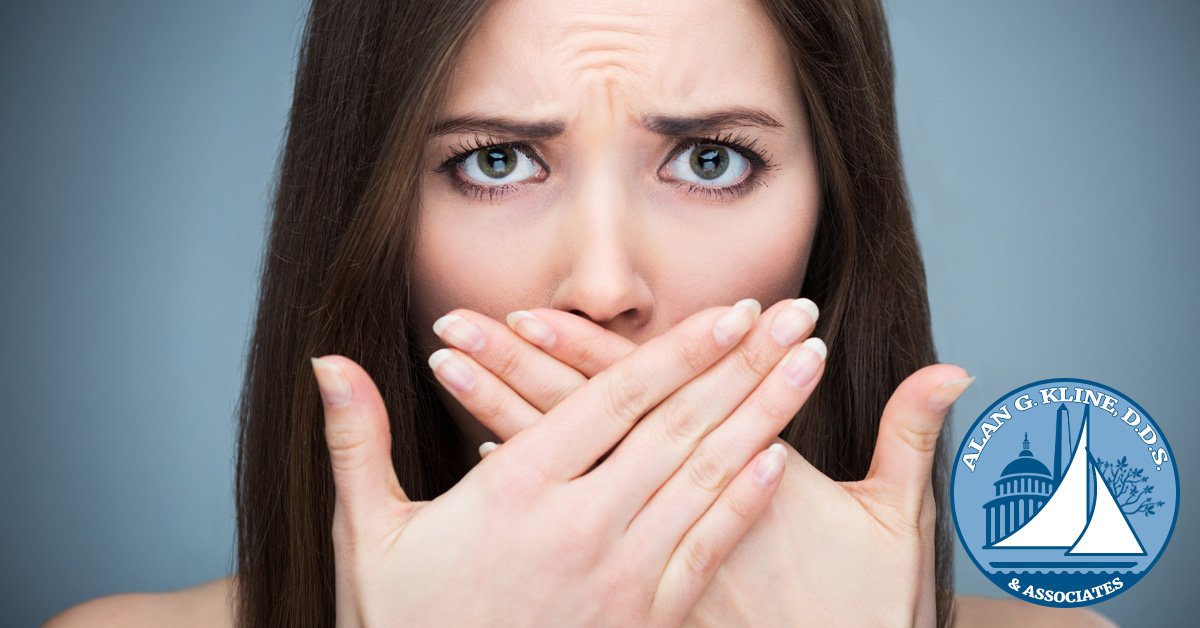 We have all had bad breath, or halitosis, sometime in our lives, whether we realize it or not.
We have all had bad breath, or halitosis, sometime in our lives, whether we realize it or not.
The challenging part is identifying it when it’s our own bad breath (but very easy to detect when speaking to someone with it). Sure, we’ve all breathed into our hands and tried to smell our breath, but the best way to know if you have bad breath is to ask someone. A true friend answers you honestly when you ask if your breath smells.
Even if you’re unsure if you have bad breath, it’s better to know its causes and work daily to prevent it.
5 Causes of Bad Breath
1-Certain Foods – Onions, garlic, and aromatic spices affect your breath. When digested in your stomach, the odors can travel to your mouth. The foods also enter your bloodstream into your lungs, affecting your breath. Continual acid reflux can also contribute to bad breath since those acids reach your mouth from your esophagus.
2-Tobacco—Smoking will make your breath have a distinctive odor to it. Still, nicotine can also negatively affect the health of your mouth. It can contribute to gum disease, a source of bad breath.
3-Dry Mouth—We’ve all heard the term “morning breath.” This occurs because our mouths dry out as we sleep. Saliva naturally cleanses our mouths, helping to carry away odor-causing bacteria and food particles, so a person who sleeps with their mouth open will inevitably wake up with bad breath. Medications and other medical conditions can also cause dry mouth, leading to bad breath.
4-Oral and Sinus Infections – Mouth sores or surgical wounds that occur after things such as tooth removal can cause bad breath. Sinus infections that produce postnasal drip can also create bad breath.
5-Poor Dental Hygiene—If you neglect to brush your teeth twice a day and floss daily, harmful bacteria can build up and cause bad breath. If you wear dentures and aren’t cleaning them properly and regularly, bacteria can build up to create bad breath.
Cures for Bad Breath
Products such as mouthwash, gum, and mints cover up bad breath temporarily without a long-term solution. It’s better to find the cause of your bad breath and create a plan to address it.
Here are some habits to incorporate to eliminate and avoid bad breath:
1-Be aware of the foods you are eating. Constant intake of acidic foods and beverages and spicy, aromatic foods could be causing your bad breath.
2-Take small steps to wean yourself off tobacco. This is a difficult one, but your mouth will thank you for it.
3-Look into ways to counteract the effects of dry mouth, such as chewing sugarless gum throughout the day. Be sure always to brush your teeth before bed, a time when saliva is more limited, and bacteria will be attracted to debris on your teeth.
4-Tend to any wounds or sores in your mouth, and follow up with your dental surgeon after surgery.
5-Incorporate excellent dental hygiene habits into your daily life. Brush twice a day, and floss every day to remove debris from between your teeth. Don’t forget to brush your tongue—a place where bacteria love to hang out and create bad breath.
Come into our office at least twice a year so that we can assist you with your dental hygiene goals. Like a good friend, we’ll tell you kindly if you have bad breath so no one else has to. What’s more important—we’ll help you get rid of it.